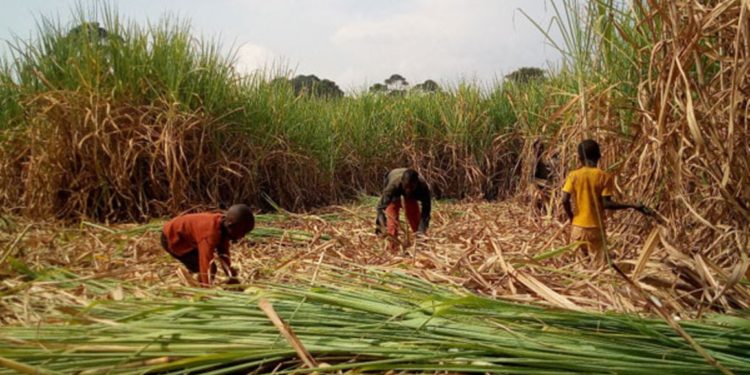By Martha Leah Nangalama
In Uganda’s Luuka District, sugarcane fields stretch as far as the eye can see, appearing peaceful and prosperous. But this tranquil illusion hides a rotten core of exploitation, corruption, and unbridled greed. What was once a land of promise has become a nightmare for its inhabitants, where human lives are trampled underfoot, crushed by the relentless greed of sugarcane barons. Luuka, once a vibrant community, is now a desolate wasteland of shattered lives, broken dreams, and souls enslaved by the sugarcane industry’s insatiable thirst for profit.
The horror of Luuka’s sugarcane plantations is epitomized by the exploitation of children—innocent lives used as cheap, expendable labor. Children as young as four years old are dragged into the fields, their tiny hands forced to cut and bundle sugarcane from dawn till dusk. This monstrous abuse, disguised as work, is a vile stain on humanity, reminiscent of the most barbaric forms of slavery. Lured by the pathetic promise of a few shillings, these children are stripped of their childhoods, their education, and their futures. The sugarcane industry is not just stealing their time—it is robbing them of their humanity, condemning them to a life of ignorance and misery.
As the sugarcane industry’s greed grows, so does the violent battle for land. Powerful sugarcane companies, backed by corrupt officials and manipulated legal systems, are snatching land from its rightful owners, tearing families apart and turning neighbors into enemies. Villages that once thrived on peace and cooperation are now battlegrounds of rage, domestic violence, and despair. Reports show that an overwhelming 80% of cases at the Resident District Commissioner’s office are linked to these land disputes. The land, which should be a source of life and unity, has become a cursed battlefield, scarring the community beyond repair.
The unrelenting spread of sugarcane fields has decimated Luuka’s food security. Greedy men, blinded by the allure of quick cash, lease every available piece of land to sugarcane growers, leaving nothing for essential food crops. Women, the traditional keepers of food security, are silenced, their pleas drowned out by the cacophony of greed. As a result, malnutrition is skyrocketing, and the community teeters on the brink of starvation. Once self-sufficient, Luuka is now dependent on food from outside sources—a cruel irony for a land that should be feeding itself. The sugarcane fields, which should symbolize prosperity, have instead become a death knell for Luuka’s survival.
The education of Luuka’s children has been obliterated, sacrificed at the altar of sugarcane profits. Schools stand empty, classrooms silent, as children abandon their studies for the meager earnings promised by the fields. The lure of instant cash is irresistible, even if it means forsaking a future of possibilities. The dropout rate is skyrocketing, a grim testament to the sugarcane industry’s devastating impact. An entire generation is being condemned to ignorance, trapped in a vicious cycle of poverty, unable to rise above the misery into which they were born. Luuka’s future is being systematically destroyed, one child at a time.
The sugar companies’ pitiful attempts at corporate social responsibility are nothing more than pathetic smokescreens to mask the devastation they’ve caused. A few repaired roads and a handful of school buildings do nothing to address the systemic exploitation and suffering inflicted upon the people of Luuka. True responsibility requires genuine commitment to human rights, sustainable development, and the well-being of the community—not hollow gestures meant to placate critics. The people of Luuka deserve more than crumbs—they deserve justice, respect, and the chance to reclaim their lives and their land.
The sugarcane industry in Luuka District is a cancer that feeds on exploitation and suffering, valuing profits over people. It is time for this abomination to end. The local government, civil society, and the international community must unite to demand accountability, enforce human rights, and restore justice to Luuka. The bitter reality of Luuka’s sugarcane should serve as a rallying cry—a call to end this cycle of oppression and build a future where the people of Luuka can live with dignity, free from the chains of exploitation.







Discussion about this post